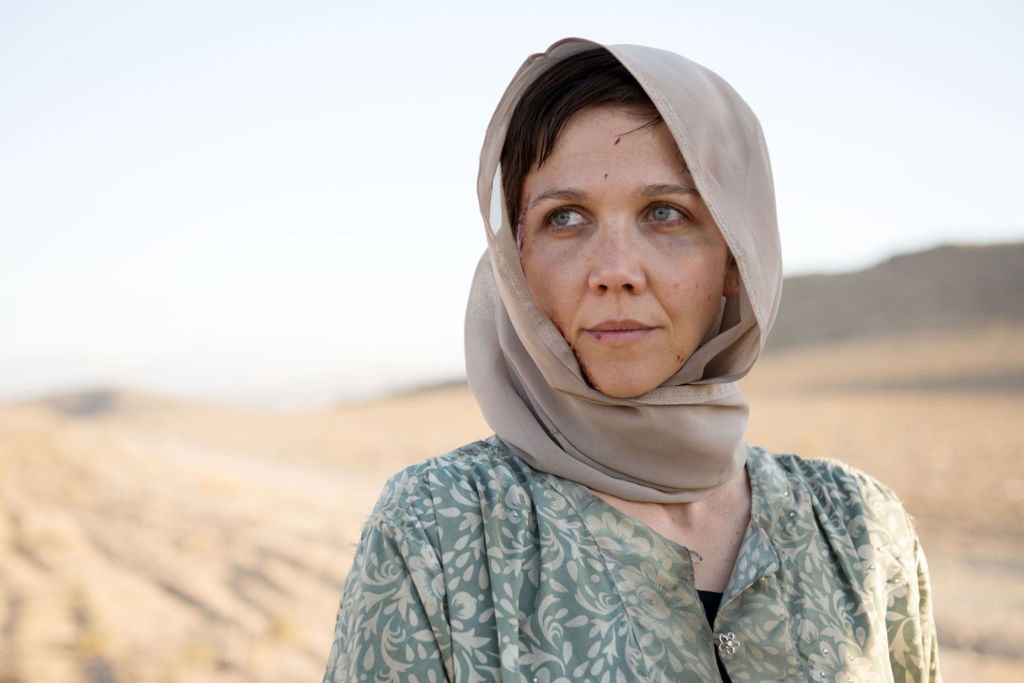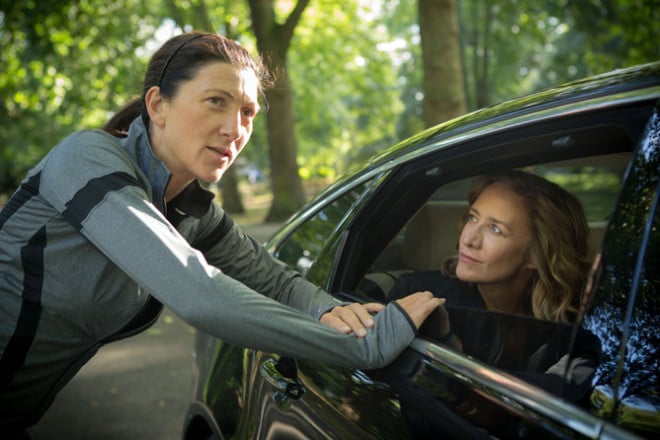You Need To Watch Maggie Gyllenhaal In ‘The Honourable Woman’
A return to the classic BBC mini-series, married with the big budget and star power of marquee TV, packed with strong female characters.

“Who do you trust?”
They’re the first four words of every episode of The Honourable Woman. You spend all eight episodes unable to answer the question.
Part family drama, part political thriller, and part spy game, this mini-series — which comes Foxtel’s BBC First on Monday night — might just be the pinnacle of short-form TV drama.
Played by Maggie Gyllenhaal, Baroness Nessa Stein is the lead character: a British-Israeli businesswoman who has just ascended to the House of Lords. When she’s not stomping the hallways of Parliament in her red cape, she’s the smooth-talking head of the Stein Group. The family business made its fortune arming Israel during the formation of the Jewish state. But Nessa’s in charge now, along with her brother Ephra (Andrew Buchan), and has peace in the Middle East in her sights.
Art Mirrors Life
The Honourable Woman aired in the UK in the midst of the recent flare-up between Israel and Palestine, with such good timing that you could be forgiven for casting a suspicious eye at BBC Two and Sundance Channel, who co-produced the series. While an understanding of the ongoing conflict is useful, it is by no means essential; like any truly riveting drama, the conflict here isn’t purely political. The series illuminates some factors of life in Israel and Palestine that no news cycle can humanise (soz, Fox News), and the personal dramas of the Stein family, despite their wealth and prestige, are universal: grief, filial responsibility, loyalty. tension and fidelity.
Gyllenhaal is perfect as Nessa Stein. Publicly composed, charming as hell behind a lectern, and completely unimpressed by male corporate bullies, she is the stuff protagonists are made of. In private though, when Nessa cries, you feel the pain of every contorted muscle in her face.
A refreshing contrast to Homeland‘s Carrie, Stein is a formidable, savvy leader, consciously using everything at her disposal to make good on the fact that her family’s fortune came at the expense of others’ lives.
Expertly crafted by writer/director Hugo Blick, female characters fiercely drive the drama of THW. Running Thelma to Nessa’s Louise is Atika Halabi, the Stein family staffer of Palestinian origins. Played brilliantly by Lubna Azabal, Atika maintains a secretive connection between the Israeli businesswoman and the Palestinian nanny, which make the personal political, and vice versa.
But to reduce the political conflict to a tale of two women doesn’t do it justice. Early on, we learn that Nessa’s mantra is “We cannot be compromised”, and it is repeated to such a degree that you wonder just how compromised she will become to achieve her goal. As Blick points out, “You can’t observe something unobserved. You can’t do something without an effect.”
Observation is a recurring theme throughout THW. Circling (and at times intersecting) the Stein family drama is intelligence agency MI5, charged with keeping Nessa and her interests safe (or are they?). Stephen Rae gives one of the performances of his career as quintessentially British spy Hugh Hayden-Hoyle, slowly and methodically unpacking the numerous intrigues that surround the Steins. Meanwhile, his superior Dame Julia Walsh (Janet McTeer) has some of the best lines of the series and, along with upwardly mobile spy Monica Chatwin (Eve Best), continues THW praise-worthy depiction of women in power.
Part of what makes THW so wonderfully nail-biting is the knowledge that these eight episodes are all we get. There will be no “six seasons and a movie”; it’s a return to the classic BBC mini-series, married with the big budget and star power of HBO-style marquee TV.
With Blick, Gyllenhaal and the rest of the cast, you are in the hands of expert storytellers, with no time for THW to become stale or drawn out. Each episode is so thick with tension that the now-“old school” weekly serialisation is almost essential; anyone planning to binge-watch THW should ensure nearby heart medication and a support group. If the show were a movie, it couldn’t achieve this depth; and if it were a classic US 22 episode per season series, it would quickly lose its way. It’s a terrific example of dramatic economy, and restraint.
One day, when we look back at the moment that television stole the best writers and actors and left cinema for the likes of Michael Bay and some sass-mouthed pixels, I’d wager that The Honourable Woman would be a series we use as an example of why. It’s hard work, but rewarding; compelling and intriguing; and portrays (demands, even) an overdue respect for female characterisation. This writer hates you all for getting to watch it with fresh eyes.
–
The Honourable Woman premieres on Foxtel’s BBC First at 8.30pm, on Monday September 15.
–
Nic Holas has written for Hello Mr Magazine, Star Observer, The Needle Prick Project, and Cosmopolitan. You can find him on Twitter @nicheholas, or in his role as co-founder of HIV social umbrella The Institute of Many.
